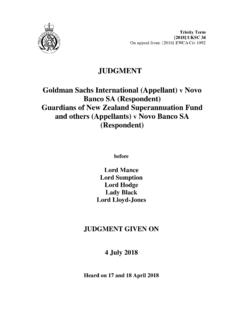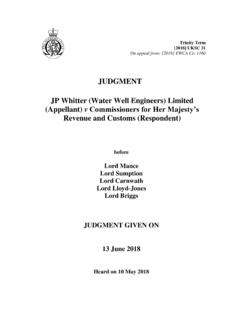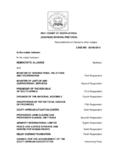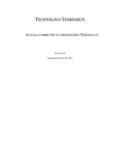Transcription of In the matter of an application by the NI Human …
1 Trinity Term [2018] UKSC 27 On appeal from: [ 2017 ] NICA 42 JUDGMENT In the matter of an application by the Northern Ireland Human Rights Commission for Judicial Review (Northern Ireland) Reference by the Court of Appeal in Northern Ireland pursuant to Paragraph 33 of Schedule 10 to the Northern Ireland Act 1998 (Abortion) (Northern Ireland) before Lady Hale, President Lord Mance Lord Kerr Lord Wilson Lord Reed Lady Black Lord Lloyd-Jones JUDGMENT GIVEN ON 7 June 2018 Heard on 24, 25 and 26 October 2017 Appellant (NIHRC) Respondent (1) (Department of Justice)
2 Nathalie Lieven QC Laura McMahon BL Tony McGleenan QC Paul McLaughlin BL David Blundell Emma McIlveen BL (Instructed by Northern Ireland Human Rights Commission) (Instructed by Departmental Solicitors Office, Department of Finance and Personnel) Respondent (2) (Attorney General for Northern Ireland) John F Larkin QC Attorney General for NI Martin Chamberlain QC Denise Kiley BL (Instructed by Office of The Attorney General for Northern Ireland) Interveners Counsel details Instructed by 1st Intervener Humanists UK Caoilfhionn Gallagher QC Fiona Murphy Mary-Rachel McCabe Bhatt Murphy 2nd Intervener United Nations Working Group on the Issue of Discrimination Against Women in Law and Practice Helen Mountfield QC Zoe Leventhal Anita Davies Frances Raday Deighton Pierce Glynn 3rd Intervener (JR76) Karen Quinlivan QC Sean Devine BL Stephen Chambers Solicitors Ltd 4th Interveners (a) Sarah Ewart (b) Amnesty International Monye Anyadike-Danes QC Adam Straw KRW Law 5th Interveners (a)
3 Christian Action and Research in Education (CARE) (b) ADF International (UK) (c) Professor Patricia Casey Mark Hill QC MW Solicitors 6th Intervener Centre of Reproductive Rights Lord Goldsmith QC Debevoise and Plimpton LLP (Written submissions only) 7th Interveners (a) Family Planning Association (b) British Pregnancy Advisory Service (c) Abortion Support Network (d) Birthrights (e) Royal College of Midwives (f) Alliance for Choice (g) Antenatal Results and Choices Dinah Rose QC Jude Bunting Leigh Day 8th Intervener Bishops of the Roman Catholic Dioceses in Northern Ireland Brett Lockhart QC Napier and Son Solicitors (Written submissions only) 9th Intervener The Society for the Protection of Unborn Children (SPUC) Adrian Colmer BL Hewitt and Gilpin Solicitors (Written submissions only) 10th Intervener Equality and Human Rights Commission (EHRC) Jason Coppel QC Equality and Human Rights Commission (Written submissions only) Page 3 LADY HALE: 1.
4 This has proved an unusually difficult case to resolve. Not only are the substantive issues, relating to the compatibility of abortion law in Northern Ireland with articles 3 and 8 of the European Convention on Human Rights (the ECHR or the Convention), of considerable depth and sensitivity; but there is also the procedural issue raised by the Attorney General for Northern Ireland, who challenges the standing of the Northern Ireland Human Rights Commission (NIHRC) to bring these proceedings. The court is divided on both questions, but in different ways.
5 2. On the substantive compatibility issues, a majority - Lord Mance, Lord Kerr, Lord Wilson and I - hold that the current law is incompatible with the right to respect for private and family life, guaranteed by article 8 of the Convention, insofar as it prohibits abortion in cases of rape, incest and fatal foetal abnormality. Lady Black agrees with that holding in the case of fatal foetal abnormality. Lord Kerr and Lord Wilson also hold that it is incompatible with the right not to be subjected to inhuman or degrading treatment, guaranteed by article 3 of the Convention.
6 Lord Reed and Lord Lloyd-Jones hold that the law is not incompatible with either article 8 or article 3. 3. On the procedural issue, a majority - Lord Mance, Lord Reed, Lady Black and Lord Lloyd-Jones - hold that the NIHRC does not have standing to bring these proceedings and accordingly that this court has no jurisdiction to make a declaration of incompatibility to reflect the majority view on the compatibility issues. A minority - Lord Kerr, Lord Wilson and I - hold that the NIHRC does have standing and would have made a declaration of incompatibility.
7 4. In these unusual circumstances, it is not possible to follow our usual practice and identify a single lead judgment which represents the majority view on all issues. We have therefore decided to revert to the previous practice of the appellate committee of the House of Lords and print the judgments in order of seniority. It is for that reason only that my judgment comes first. Far more substantial judgments on all issues follow from Lord Mance and Lord Kerr. Introduction 5. The substantive questions in this case are legal issues - specifically related to the implementation in UK law, by the Human Rights Act 1998 (HRA), of the ECHR, Page 4 which in turn has to be interpreted in the light of other international treaties to which the UK is a party, in this case the United Nations Convention on the Elimination of All Forms of Discrimination against Women 1979 (CEDAW) and the United Nations Convention on the Rights of Persons with Disabilities 2006 (CRPD).
8 Moral and political issues, important though they undoubtedly are, are relevant only to the extent that they are relevant to the legal issues which have to be resolved. 6. The starting point for any discussion of the legal issues has to be the right of all Human beings, male and female, to decide what shall be done with their own bodies. This right has long been recognised by the common law: it is the reason why consent is needed for invasive medical treatment however well-intentioned: see Montgomery v Lanarkshire Health Board (General Medical Council intervening) [2015] AC 1430.
9 It is also recognised by the ECHR: see Pretty v United Kingdom (2002) 35 EHRR 1, where it was said that the notion of personal autonomy is an important principle underlying the interpretation of its guarantees (para 61). For many women, becoming pregnant is an expression of that autonomy, the fulfilment of a deep-felt desire. But for those women who become pregnant, or who are obliged to carry a pregnancy to term, against their will there can be few greater invasions of their autonomy and bodily integrity. 7. The point is vividly made in Professor Thomson s famous article ( A Defence of Abortion , reprinted in R M Dworkin (ed), The Philosophy of Law): You wake up in the morning and find yourself back to back in bed with an unconscious violinist.
10 A famous unconscious violinist. He has been found to have a fatal kidney ailment, and the Society of Music Lovers has canvassed all the available medical records and found that you alone have the right blood type to help. They have therefore kidnapped you, and last night the violinist s circulatory system was plugged into yours, so that your kidneys can be used to extract poisons from his blood as well as your own. The director of the hospital now tells you, Look, we re sorry the Society of Music Lovers did this to you - we would never have permitted it had we known.















